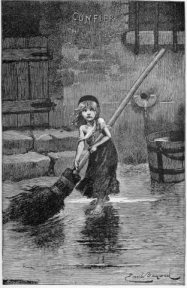[Warning: the following article may contain spoilers for those five four three people who are not yet familiar with the plot of Les Miserables.]

There are more Christian talking-points in the recently released Les Miserables than are usually available to cinephiles in a year of movie-going. For example, justice and mercy, both attributes of God, are personified by two of the main characters. The danger of legalism is a major theme. Any youth group, Bible study or Christian counselor looking for a working definition of grace need look no further. So it is not my point to discourage anyone from making use of a wonderful opportunity to talk about spiritual things. However, the general feeling one can absorb among Christians on Facebook and Twitter is that this movie is about Jesus. Brilliant talking points notwithstanding, this movie is not about Jesus.
Set during the student uprisings following the French Revolution, Victor Hugo’s classic novel describes the starvation and degradation of the poor in 19th century Paris. In the movie version, Anne Hathaway delivers the finest acting performance of her career (or perhaps any other) as Fantine, a desperate single-mother who is driven to prostitution. Hugh Jackman is nearly unrecognizable, and nearly as good, as Jean Valjean, the ex-con who agrees to raise Fantine’s daughter after her death. Within that setting, the story contrasts the rule of law with the rule of love, and that is the emphasis w hich has caused many Christians to claim the musical and the movie as their own. In particular, an early scene features a bishop covering for Valjean who has stolen silver from the rectory. In addition, the priest gives Valjean some even more valuable candlesticks. This image is a beautiful picture of the grace of Christ who freely forgives our sins and then gives us the gift of His Spirit. The silver allows Valjean to start a new life, just as Christ’s gifts make us new.
hich has caused many Christians to claim the musical and the movie as their own. In particular, an early scene features a bishop covering for Valjean who has stolen silver from the rectory. In addition, the priest gives Valjean some even more valuable candlesticks. This image is a beautiful picture of the grace of Christ who freely forgives our sins and then gives us the gift of His Spirit. The silver allows Valjean to start a new life, just as Christ’s gifts make us new.
The difference between Les Mis and Christianity is not found so much in those first twenty minutes as it is in the next 2 1/2 hours. Victor Hugo was a deist who believed that human love is the highest form of god that we can know. (Read the first article referenced below for more on Hugo.) The message of his story is that being good, being loving, is the pathway to heaven. The Bishop who forgave Valjean set him on a new road, but with an old mission – earn your salvation. Not by being law-abiding, but by being merciful. The plot-line and the philosophy of Les Mis is confusing enough for Christians to believe we have seen Christ’s sufficient sacrifice portrayed when we haven’t. It’s rather like those visual tricks where you read a sentence the way you expect to see it rather than the way it is actually written.
While Biblical Christianity teaches us to respond in gratitude for the love God has already given us, in a sense, it doesn’t matter what our lives look like going forward. Our salvation is a done deal. We know our lives will be more loving and graceful because that is God’s work in us, but we don’t earn anything by it. In Hugo’s novel, as well as the play and the movie, Valjean spends his life attempting to justify the priest’s faith in him, to earn the second chance he has been given. In the end Valjean goes to heaven, not because God has loved him, but because he has loved others. It is the same message which transforms Scrooge in Dickens’ A Christmas Carol. And it’s the same message which echoes through the haunting movie, Saving Private Ryan. As the protagonist, Captain Miller, lies dying, having sacrificed himself to save the eponymous private, he whispers his final words: “Earn this.” Which is exactly what Jesus doesn’t say.
Related articles:
Sentiments Abstractly Christian – an extensive explanation of Hugo’s philosophy from Touchstone Journal
Les Miserables: Movie Review – serious and helpful review of the film from fervr
Best Les Mis Review – short, very funny review from a modern man’s perspective
